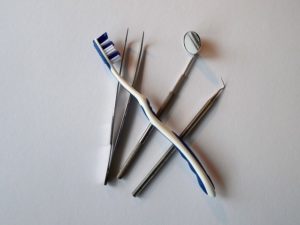
Periodontal Disease Causes
The short answer to what causes periodontal disease is bacteria. When someone is not brushing or flossing regularly, bacteria build up on the surface of the teeth. These bacteria then form into a sticky substance on the teeth called plaque. The plaque then hardens and forms a bond around your teeth. In this way, it harbors bacteria, causing inflammation of your gum and even bleeding, especially when you brush. The best defense against bacteria is proper oral hygiene. Brushing twice a day with a dentist recommended toothbrush and toothpaste, along with daily flossing keeps your teeth clean. It also goes a long way to the buildup of bacteria from lasting long enough on the teeth to harden and fester. While a preventative approach is optimal, other risk factors can come into play as well. Genetics, poor diet, stress and smoking can increase your risk of periodontal disease. It’s important to address any risk factors that are a choice.
Treatment for Periodontal Disease
Treatment varies depending on the stage of gum disease. Gingivitis, for example, is considered to be milder and can sometimes be treated fully with a good cleaning and better oral hygiene. Once gingivitis has been left untreated, however, it turns into a more serious form of periodontal disease called periodontitis. With periodontitis, not only are the gums affected, but the buildup of toxins can cause permanent damage to the surrounding bone, ligaments, and tissue. In some extreme cases, a patient can experience tooth loss. For this advanced form of periodontal disease, the dentist performs a more thorough form of cleaning. This cleaning is called scaling and is a heavy-duty cleaning designed to rid the mouth of hard plaque buildup and toxins. The next step for treatment includes an approved dental surgery and grafting. Regardless of your disease prevalence and treatment plan, consistent and correct home care is a critical component to the controlling of periodontal disease.
Periodontal disease can range anywhere from minor gum irritation to the irreversible loss of tooth and bone. A patient’s commitment to eliminating risk factors such as smoking and high sugar diet coupled with proper daily oral hygiene can protect your teeth from gum disease. Dental treatments for advanced issues are painful and expensive and best avoided at all costs. In addition to an established home routine, find a dentist and be vigilant in getting regular professional cleanings. Any disease left untreated, can cause a lot of pain and expense down the road, not to mention it can contribute to a whole host of other medical issues. If you find yourself experiencing a toothache, bright red gums, loose teeth, receding gums, tender gums, or tooth loss, contact your dentist for an exam right away.
